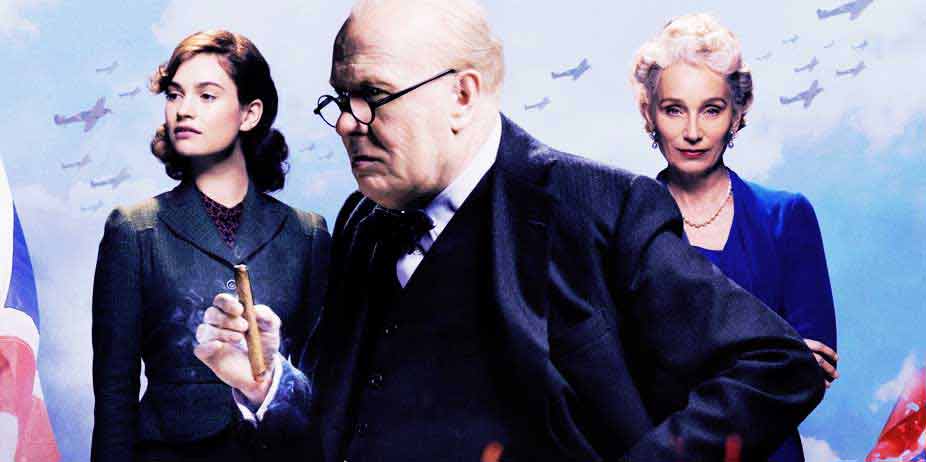
Darkest Hour (2017)
Before WWII, London found itself facing a difficult decision of whether to negotiate with Hitler, or challenge the Nazis. This film covers the early period of Winston Churchill's time as Prime Minister, and tries to provide both an intimate and a professional portrait of one of history's most famous men.
Young Elizabeth Layton (Lily James) turns up to her new job on the dot, but five minutes alone with the gruff, rude, and erratic Winston Churchill (Gary Oldman) sends her downstairs in tears. When Mrs. Churchill (Kristen Scott-Thomas) encounters her, she storms into her husband's bedroom to chastise him, saying power has made him cross. "I want people to like you as much as I do," she says. He grunts.
Before the end of the day, a telegram arrives from Buckingham Palace... he has been asked to stand as Prime Minister, and "form a new government." The king (Ben Mendelson) does not think much of him, nor does Viscount Halifax (Stephen Dillane), with whom Churchill butts heads on matters of policy. Halifax insists on brokering peace; Churchill believes they have no alternative but war. He faces opposition from every quarter, as he fights for what he believes is in England's best interests... and Elizabeth helps him along the way.
After John Lithgow's tremendous stint as an old Churchill in Netflix's The Crown, it's hard for me to see anyone else in the role. Oldman gives a terrific performance, even if he seems to lack the energy I would expect from Churchill. The supporting cast greatly aids the momentum of the film, notably Kirsten Scott-Thomas, whom we do not see enough of, as his wise and tolerant wife. Some of the more poignant moments come when the film acknowledges the sacrifices of his family which led to his eventual success; she toasts his appointment to Prime Minister, but also laments that politics have taken him many times from their sides. Dillane is, as always, stoic and memorable, as he leads an underground movement against Churchill to undermine his authority.
History wise, the story has been enhanced for dramatic effect; Churchill did not face as much opposition as the film projects, but many of its moments are based on facts, his eccentric nature is never under-played (his tendency to dictate letters to his secretaries from the bathtub, for example), and happily, Churchill in this version finally has his much-remarked-on sense of humor! He banters, he quips, he roars with laughter to find out his own faux-pas, and is quite good natured. If you're fond of biopics, or this period in history, it's an excellent way to spend a couple of hours, although it can also feel long in its duller patches.
Sexual Content:
None.
Language:
A couple of uses of GD, mild profanities; Churchill's
famous phrase, "keep buggering on," and "don't bugger it
up."
Violence:
Glimpses of wartime violence / planes / bombings.
Other:
Churchill learns that his Victory sign, when held in the
wrong position, actually means, "Up your bum," in the
lower classes.
